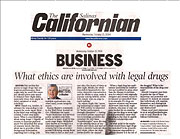Integrity Matters
October 13 , 2004
What ethics are involved with legal
drugs

 Question: (E-146)
Question: (E-146)
Dear Jim:
Our society has access to legal drugs that can improve
performance. How ought they be used? For example: should
pilots take speed to enhance their flight skills, especially
when they might be tired, unrelated to work schedule?
 Response:
Response:
Thank you, readers, in advance for responding to my
request for some input. Now in my third year writing
this column, I need your assistance. What is your thinking
about using drugs -- legally, of course, to improve performance?
I've identified five areas of concern below. But first,
allow me to provide a little background information regarding
how a drug, with multiple applications, can, when used,
create integrity issues.
Sharon Begley's comments in
the Wall Street Journal on Oct. 1 illustrate the issue: "Some
musicians and nervous public speakers take beta blockers
(a heart drug) to vanquish stage fright. Modafinil (also
known as Provigil) is a stimulant approved for narcolepsy,
but it has an underground following among those who want
to feel as alert and rest after five hours of sleep as
after eight. Ritalin, for attention-deficit hyperactivity
disorder, improves concentration and the ability to plan,
make it popular among healthy adults who simply want
an edge in multi-tasking."
So, where might this "seeming technological magic" lead
us? Will society be improved by "better performance
through chemistry" -- having uncovered golden opportunities
to leverage scientific discoveries? Or, will these "breakthroughs" open
the way to life-altering abuse of our bodies and minds
and hurl us down a morally bankrupt slippery slope, where
the ends always justify the means?
When a legal drug has applications (perceived as constructive
and positive) in areas other than the disease or problem
area for which it was originally designed and created,
should it be banned or controlled? Here is an example.
If a drug can improve memory and increase short-term
data recall, ought students, who may or may not have
studied for an examination, use the drug to score higher
and potentially cause their standing in the class to
qualify them for scholarships and awards?
At what point in the supply chain should these legal
drugs be controlled? Is the prescribing physician responsible
to prevent abuses? Is it the job of the druggist? What
is the responsibility of the drug company?
Should Congress pass laws to guide the use of these
important and powerful substances? Or should we assume
that individuals will regulate themselves and distinguish
between what is appropriate and destructive?